Movie Review
 |
 |
 |
 |
 |
 |
 |
Father Stu: A Blasphemous & Irreverent ‘Redemption Story’
Marian T Horvat
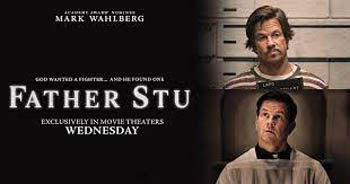
Wins the prize for blasphemous language
It has been a long while since I have ventured into an AMC theater, and I hesitated a moment to enter the wolves' den. But the exigency of the request and timeliness of the topic won the day, and yesterday I viewed Father Stu.
Today, I can, without a moment's hesitation, assure our reader it was no false alarm when the bells of her sensus fidelium sounded. The 'R' movie fully earned its rating: Father Stu is blasphemous and immoral, the characters are incredibly vulgar and shamefully immodest.
Worse still, the film undermines Traditionalism and strongly promotes the Vatican II vision of the Church: casual, egalitarian and tolerant, embracing the customs and ways of the Modern World. This evil is worked in an ambience saturated with sentimentality and emotion. The middle-aged Latino woman sitting to my right sobbed audibly nine times during the two-hour movie.
A 'baptism' of blasphemy & immorality
Father Stu (played by Mark Wahlberg) is based on the true story of Stuart Long, an amateur washed-out boxer in Montana who moves to Hollywood to pursue an acting career. He leaves his very dysfunctional and foul-mouthed mother (Jacki Weaver) to find the good life in California, where his equally dysfunctional and even more foul-mouthed father (Mel Gibson) lives.
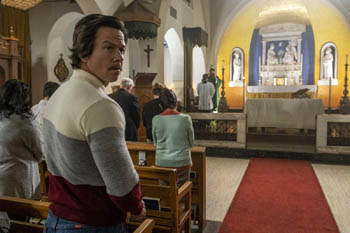
Novus Ordo priests, church & mentality in full force
She demands his "baptism" (rather than a true conversion) before they "date," and he is duly catechized in modern sit-around-and-testify catechesis sessions. At the baptismal fount, he strips to bare his very "buff" torso, raising smiles from the priest and the admiring women present.
Here is an early example of how everything that should be serious and sacral is treated very lightly and casually. Such a sacrilegious baptism should not be entertaining for anyone who takes the Church, priesthood and the Sacraments seriously.
Let me insert here that this supposedly very religious Carmen is a modern Catholic. She wears seductive clothing and could not be more sensuous when she and Stu sing “Jackson” together at a karaoke bar where all the young Catholics gather. That is to say, she – like all the other young Catholics and priests in the film – is more Protestant than Catholic.
Father Stu serves a syrupy dish of a sentimental religion of forgiveness and love, complete with mushy country rock music strumming in the background of religious scenes. God is good and forgiving – which in fact is true – and conversion does not demand any radical change in customs or ways of being – which is untrue. Nothing on the plate reflects the doctrinal, ceremonial and firm Catholicism of the past.
More Protestant than Catholic
Let us return to the story. After an encounter in a bar with a scarred-face old-hippie Jesus-figure who tells Stu not to drink and drive, a very sotted Stu drives home on his motorcycle and has a terrible accident. Unconscious and bloody, a Latino Virgin Mary appears to him in a soppy scene and tells him he will not die from this. The woman next to me burst into sobs.
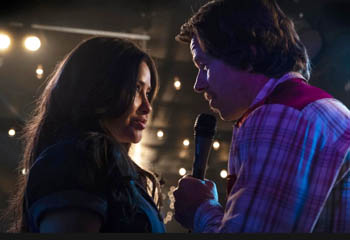
A provocative karaoke bar scene with Stu & Carmen
When Stu confesses this grave sin to the priest, he does so with his typical foul language and no sign of contrition. He is too absorbed in his experience with Christ to bother with that. In fact, in the various confession scenes, we never witness contrition or absolution.
Again, the attitudes and actions are more Protestant than Catholic. It is the Vatican II Church that is celebrated here. Blasphemy and immorality are ignored; what counts is the emotional high of finding Jesus, with a little bit of the Virgin thrown in to satisfy the sentimentally pious Catholics.
The rest of the story
Stu recovers and becomes convinced God is calling him to the priesthood. He storms into the Monsignor's office to protest the Church's banality for considering the legal liabilities of accepting an explosive and violent ex-criminal into the seminary. Of course, the Monsignor relents and Stu enters the seminary.
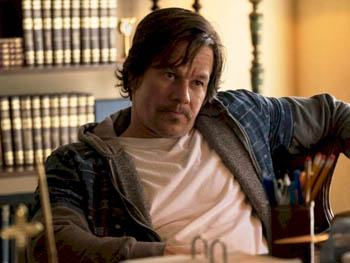
Visiting the Monsignor to argue his case
So, what is correct and proper becomes the object of scorn and despisal. I certainly did not like the holier-than-thou seminarian. Nor did the woman sitting next to me, who laughed heartily at all Stu's antics and bad words, cheering on his revolutionary spirit of rebellion. Any unsuspecting person watching Father Stu may likewise find himself justifying the Conciliar Church with all of its abuses because everything is so craftily manipulated to make the viewer become like the punk seminarian Stu.
And so Stu advances in the Novus Ordo seminary – always on his terms, we see no attempt by the church authorities to correct his vices. Suddenly one day he collapses on the basketball court and is diagnosed with Inclusion Body Myositis, a rare and incurable muscular degenerative disease that will ultimately claim his life.
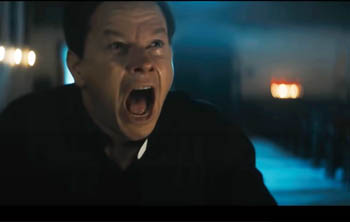
Screaming furiously at God in church
Further, this conformity to the will of God does not mean that Father Stu must leave off his blasphemous language, sarcastic exchanges with his parents and fits of anger. We – like God – must accept him as he is and love him even with his defects. It is Protestantism, not Catholicism.
When he is told by the Monsignor that he cannot become a priest because his degenerative disease could cause him to drop the Sacred Host or spill the Precious Blood of Christ or disgrace his priestly duties, he dismisses these arguments as irrelevant. What is important is that Father Stu will help people.
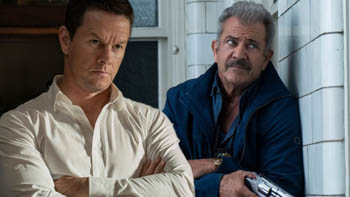
His father (Gibson) encourages Stu to shoot himself rather than be a priest
In the end, Father Stu "converts" his parents (we are not sure this conversion means a return to the practice of the Catholic Faith) and becomes a priest.
Outside the boundaries of decency
I hope I have said enough for serious Catholic clergy and parents to realize that Father Stu did not stay within the boundaries of decency. This is not "a movie for everyone," as the film's promoters boast. It is not a movie for those who still believe blasphemy and immorality are never acceptable viewing material, especially when it is wrapped in attractive paper.
From beginning to end – an early scene shows young Stu dressed only in his underpants and socks dancing provocatively to Elvis Presley music while his half-drunk father mocks him – you will encounter disturbing and offensive scenes.
In short, viewers are invited to enter the sheep yard and smell the manure, to mix with the degenerate to save them rather than raise them to a higher plane. It is exactly what Francis counsels Catholics to do, to embrace and enter into the ugliness and messiness of life.
The trouble with this redemption story is that we never leave the barnyard. There is no conversion from the corrupted customs of the Modern World and the tolerant religion of the Vatican II, which are presented as amusing and normal.

Gibson's ‘girlfriend’ directed the film
This is faulty reasoning. I think it extremely telling to know that the film is scripted and directed by Rosalind Ross, Gibson’s 31-year-old longtime "girlfriend" with whom he has a 4-year-old son. It is a bug-eyed and somewhat unhinged Gibson we see in the film, given to outbursts of rage and blasphemous language, and consistently behaving in a vulgar and crude way. I had the impression that the haunting personal despair he plays so perfectly is not a role, but a reality.
Gibson himself – like Stu's father – seems confused and lost, hopeful and desperate for a redemption. But that victory will come only with leaving the futile life of sin and having a true contrition. We never see this contrition in Fr. Stu or his father, but I hope and pray that in fact Our Lady has mercy and gives an honest Catholic conversion to Gibson, who gave the world The Passion of the Christ.
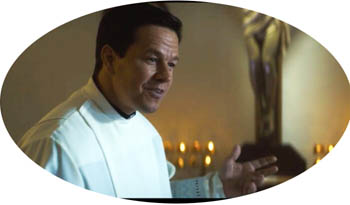
Catholic imagery thrown in to entice the unwary

Posted May 11, 2022
______________________
______________________





